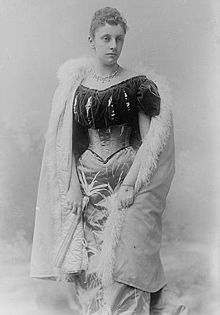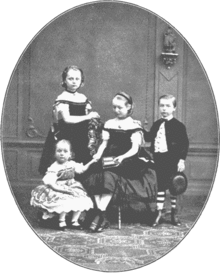Princess Feodora Adelheid of Schleswig-Holstein-Sonderburg-Augustenburg
 From Wikipedia the free encyclopedia
From Wikipedia the free encyclopedia
| Princess Feodora | |
|---|---|
 Feodora in 1909 | |
| Born | 3 July 1874 Przemków |
| Died | 21 June 1910 (aged 35) Obersasbach, Germany |
| Burial | |
| House | Schleswig-Holstein-Sonderburg-Augustenburg |
| Father | Frederick VIII, Duke of Schleswig-Holstein |
| Mother | Princess Adelheid of Hohenlohe-Langenburg |
Princess Feodora Adelheid of Schleswig-Holstein-Sonderburg-Augustenburg (Feodora Adelheid Helene Louise Caroline Pauline Alice Jenny; 3 July 1874 – 21 June 1910) was a member of the House of Schleswig-Holstein-Sonderburg-Augustenburg and was the daughter of Frederick VIII, Duke of Schleswig-Holstein.
Life and work
[edit]

Princess Feodora was the youngest daughter of seven children of the (titular) Duke Frederick VIII, Duke of Schleswig-Holstein (1829–1880) and his wife Princess Princess Adelheid of Hohenlohe-Langenburg (1835–1900),[1] second daughter of Ernst I, Prince of Hohenlohe-Langenburg and the Princess Feodora of Leiningen. Through her mother, she was the great-niece of the British Queen Victoria and her eldest sister Augusta Victoria had been with the Crown Prince of Prussia since 1881 and later Emperor Wilhelm II. She spent a harmonious childhood with her siblings in Dolzig, Kiel and at Primkenau Castle in exile, which since 1853 was owned by her grandfather, Christian August II, Duke of Schleswig-Holstein belonged. The princess was educated exclusively at home by governesses and tutors; She spoke several foreign languages and was artistically talented and interested in many ways.[2]
Her cousin and fellow painter, Lady Helena Gleichen, mentioned her in her 1940 memoir:
A charming cousin named Feo Holstein, daughter of my father’s youngest sister, Ada, who had married the Duke of Schleswig-Holstein. She was very nice and very intelligent, a poet and a painter, but terribly hampered by being sister-in-law to the German Emperor who interfered with everything she wanted to do. He would not let her go to an Art School or study from the life ; he would not let her go anywhere she wanted to. Her independent spirit was stamping and fuming over all her restrictions, and she envied us for our independence and freedom from all regulations. Considering how little training she had, her writings and drawings were really good and full of imagination. Feo Holstein and I had some very happy times painting out in the lovely Potsdam woods.[3]
Feodora studied at the Art Academy of Fine Arts in Dresden. Her paternal mentor, Privy Councilor Max Lehrs, dedicated words of appreciation to her posthumously: "She was a princess in spirit and what might be more said, a princess of heart..." She maintained a particularly close relationship with Fritz Mackensen, the co-founder of the Artists' Colony Worpswede near Bremen (1889) . Mackensen was her artistic teacher. The Princess visited Mackensen in Worpswede in 1899, where she also came into contact with the other members of the artist community -Heinrich Vogeler, Hans am Ende, Paula Modersohn-Becker, Otto Modersohn – stepped. Vogeler provided the book decoration for her Fischer novel Through the Fog, published in 1908 by G. Grotesche Verlagsbuchhandlung, Berlin.[4]

Princess Feodora, who had been ailing for several years, died unexpectedly on June 21, 1910, on their property in Hochfelden in the Black Forest.[1]
Ancestry
[edit]| Ancestors of Princess Feodora Adelheid of Schleswig-Holstein-Sonderburg-Augustenburg | |||||||||||||||||||||||||||||||||||||||||||||||||||||||||||||||||||||||||||||||||||||||||||||||||||||||||||||||||||||||||||||||||||||||||||||||||||||||||||||||||||||||||||||||||||||||||||||||||||||||||||||||||||||||||||||||||||||||||||||||||||||||||||||||||||||||||||||||||||||||||
|---|---|---|---|---|---|---|---|---|---|---|---|---|---|---|---|---|---|---|---|---|---|---|---|---|---|---|---|---|---|---|---|---|---|---|---|---|---|---|---|---|---|---|---|---|---|---|---|---|---|---|---|---|---|---|---|---|---|---|---|---|---|---|---|---|---|---|---|---|---|---|---|---|---|---|---|---|---|---|---|---|---|---|---|---|---|---|---|---|---|---|---|---|---|---|---|---|---|---|---|---|---|---|---|---|---|---|---|---|---|---|---|---|---|---|---|---|---|---|---|---|---|---|---|---|---|---|---|---|---|---|---|---|---|---|---|---|---|---|---|---|---|---|---|---|---|---|---|---|---|---|---|---|---|---|---|---|---|---|---|---|---|---|---|---|---|---|---|---|---|---|---|---|---|---|---|---|---|---|---|---|---|---|---|---|---|---|---|---|---|---|---|---|---|---|---|---|---|---|---|---|---|---|---|---|---|---|---|---|---|---|---|---|---|---|---|---|---|---|---|---|---|---|---|---|---|---|---|---|---|---|---|---|---|---|---|---|---|---|---|---|---|---|---|---|---|---|---|---|---|---|---|---|---|---|---|---|---|---|---|---|---|---|---|---|---|---|---|---|---|---|---|---|---|---|---|---|---|---|---|---|---|
| |||||||||||||||||||||||||||||||||||||||||||||||||||||||||||||||||||||||||||||||||||||||||||||||||||||||||||||||||||||||||||||||||||||||||||||||||||||||||||||||||||||||||||||||||||||||||||||||||||||||||||||||||||||||||||||||||||||||||||||||||||||||||||||||||||||||||||||||||||||||||
References
[edit]- ^ a b "Feodora1912".
- ^ Prinzessin Feodora - nach Sternen jagen ... Weilburg, Thomas. - Berlin : Berlin-Story-Verl., 2008, 1. Aufl.
- ^ Gleichen, Lady Helena (1940). Contacts and Contrasts. Butler & Tanner Ltd. pp. 40–41.
{{cite book}}: CS1 maint: date and year (link) - ^ Adolf Bartels: F. Hugin (Prinzeß Feodora von Schleswig-Holstein). In: Die Heimat. Jg. 22 (1912), Heft 1, Januar 1912, S. 1–9 (Digitalisat)